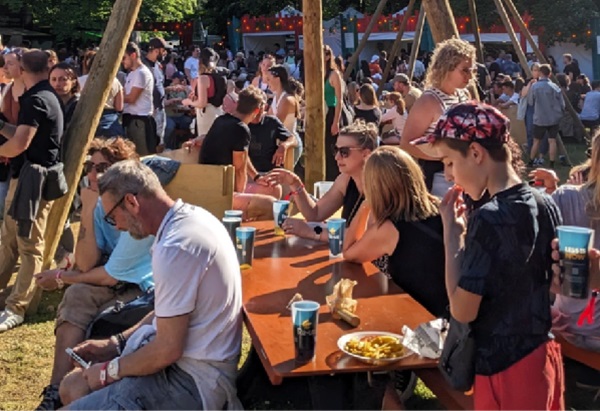 Francofolies 2023, Esch-sur-Alzette, Gaalgebierg;
Credit: Oekozenter Pafendall
Francofolies 2023, Esch-sur-Alzette, Gaalgebierg;
Credit: Oekozenter Pafendall
Considering the increasing number of events bearing the logo Green Events lately, Chronicle.lu has looked more closely into this initiative aiming to make Luxembourg events more sustainable and eco-friendly.
Launched in 2019 by Luxembourg's Ministry of the Environment, Climate and Biodiversity and coordinated by Oekozenter Pafendall and SuperDrecksKëscht (SDK), a Luxembourgish initiative focused on waste reduction and environmental sustainability, Green Events is a logo awarded to events organised by a wide array of organisations. These include associations, municipalities, NGOs and nature parks. The events that are granted this logo can be cultural, sporting and festive events. This initiative provides free, customised consultations to the aforementioned organisations aiming to assist them in making more environmentally sustainable choices when planning their events.
Green Events is an initiative that aims to combine sustainability, social cohesion and support for the regional economy within the framework of events organised in Luxembourg. It includes 58 criteria across eight categories: communication and marketing, decoration and materials, mobility, foods and beverages, waste, water and hygiene, energy and environmental engagement.
To receive the Green Events logo, organisers must complete an online checklist which comprises 30 mandatory and 28 optional criteria. Alternatively, the “Mir engagéieren eis” (we are getting involved) logo is available if an event meets half of all criteria, whether they are mandatory or optional. After completing the checklist, organisers should contact either the Oekozenter Pafendall or SDK.
“Although the process may seem daunting at first, organisers receive continuous support and feedback. Generally, organisers report positive experiences as a result of this process. One organiser noted they were so happy about the hugely reduced amount of waste that it led to changes in their own everyday life. The consultations increase awareness among event organisers about more sustainable alternatives such as regional and organic products and service providers for reusable tableware.” Manuela Gonçalves, environmental advisor at Oekozenter Pafendall said, speaking to Chronicle.lu.
Since its launch in 2024, 396 events have been awarded the “Green Events” logo (161 in 2024) or the 'Mir engagéieren eis' logo (three in 2024). As of 15 June 2024, approximately 430,500 visitors have attended Green Events. By implementing criteria 31 and 32, which ban single-use materials, many people have attended events where reusable items were used instead, leading to a notable decrease in waste from single-use plastics and cardboard containers.
Green Events typically range in size from 150 to 500 visitors. Some of the largest Green Events include the following:
- 10th International Celtic Festival Bealtaine 2024 (5500 attendees);
- De Studentebal 2023 (4400 attendees);
- Duck Race 2024 (8000 attendees);
- Familljefestival Nature 2023 (3000 attendees) ;
- Francofolies de Esch-sur-Alzette 2024 (40,000 attendees) ;
- Geenzefest 2024 (4000 attendees);
- Koll an Aktioun 2024 (2000 attendees).
According to advisors for the project Green Events at Oekozenter Pafendall, the initiative’s larger scale impact includes the integration of the Green Event principles at the municipal level, the adaptation of the private sector and increased environmental awareness. Some municipalities have thus incorporated Green Events into their environmental agendas and refurbished infrastructure to meet Green Events criteria. Such changes include clearer waste disposal signage, bans on single-use straws, organic waste bins, reusable milk and sugar containers and eco-friendly hygiene products. Reusable tableware (e.g. cups, plates, bowls) is now commonly offered even outside municipal facilities, supported by mobile dishwashing stations.
Private actors have also adapted their services to meet the demands of Green Events and other initiatives, such as Restopolis’ Supply4Future and Natur genéissen. Caterers and food trucks now offer more regional and organic ingredients. Regional products, for example flour, milk, fries, sauces, meat and wine, have become standard fare at events. Although regional produce is popular, organic produce faces challenges including a lack of information on organic products and higher costs, as noted by advisors for the project Green Events. Due to the demand for regional and organic produce, transparency about the origin of these products has increased, with butchers and bakeries more prominently displaying labels. However, a lack of standardised food labelling complicates identifying Luxembourg-sourced products, calling for advisory support. Outside of regional and organic produce, there has reportedly also been a rise in demand for reusable materials and infrastructure, driven further by the upcoming 2025 ban on single-use materials at events. Consequently, services offering reusable tableware for rent or purchase, along with dishwashing services, have become increasingly popular.
Manuela Gonçalves added: “While many event organisers are new to the project, most of them have already been incorporating certain sustainable practices well before their participation. In this case, it’s more about adaptation and mutual knowledge exchange. Green Events has shown how crucial municipalities are to sustainable development. Their participation and communication with associations are key. In exchange, event organisers raise awareness amongst members and visitors about their commitment. It’s a snowball effect that we hope gains traction even beyond our immediate sphere of influence”.
Despite progress, however, challenges remain, including the costs of renting reusables, logistical changes requiring more human resources for washing and managing reusables, a shortage of mobile dishwashing stations and reusable containers, and communication issues with caterers concerning reusable usage. Deciding who is responsible for managing reusable systems at events (whether it is the organiser or the food truck) can also be challenging.
In 2023, the General Directorate for Tourism of the Ministry of the Economy introduced Green Business Events as a counterpart to Green Events. Managed by the Oekozenter Pafendall, and based on criteria developed in collaboration with industry stakeholders, this initiative focuses on reducing the ecological footprint of business events such as conferences, congresses, conventions, exhibitions, trade shows and corporate events.
More information on Green Events is available at www.greenevents.lu.








